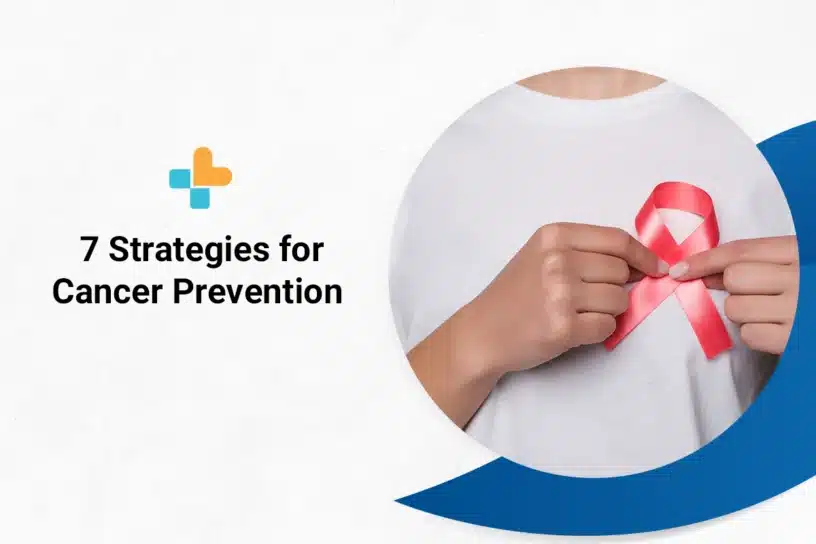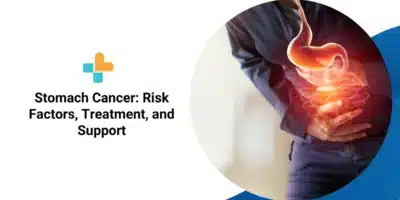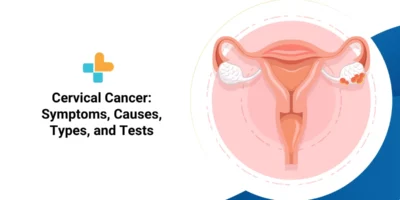In India, one in nine people will likely develop cancer in their lifetime.
According to a study, approximately 14,61,427 Indians were found with some sort of cancer in 2020, and this incidence is estimated to increase by 12.8% in 2025 as compared to 2020.
Despite these grim statistics, researchers have made significant progress in understanding the biology of cancer cells leading to improved detection and management of cancer.
While early diagnosis, frequent screening, and appropriate treatment make cancer manageable, healthy lifestyle choices and simple changes to daily routines can significantly prevent cancer risks.
In this blog, we’ll examine seven proven strategies for cancer prevention derived from the American Cancer Society Guideline for Diet and Physical Activity.
7 Effective Cancer Prevention Strategies
Waiting for a sure-shot cure for cancer won’t help you beat cancer right now. So, here are the seven best preventative strategies you can start today to keep cancer away.
1. Quit Tobacco
According to the Indian Council of Medical Research, tobacco-related cancers accounted for 27% of India’s cancer burden in 2020. India is the second leading consumer of tobacco products after China, resulting in a catastrophic case of close to 13.5 lakh preventable deaths per year.
One doesn’t have to be a scientist to understand how tobacco harms an individual’s health. Smoking poses a significant risk factor for lung, throat, and mouth cancer, while chewing tobacco has been linked to cancer of the mouth, throat and pancreas.
What you can do: Avoiding tobacco in all its forms, including exposure to secondhand smoke, is optimal for cancer prevention. Quitting smoking can be challenging, but it’s the single best thing you can do for your health.
2. Maintain a Healthy Weight
Obesity is another risk factor for many types of malignancies, including breast, lung, colon, and prostate cancer. Maintaining a healthy weight by eating a balanced diet and engaging in regular physical activity is essential to lower your risk of cancer.
What you can do: Aim for a body mass index (BMI) between 18.5 and 24.9. If you’re overweight or obese, losing just 5–10% of your body weight can significantly reduce your cancer risk.
3. UV Exposure
Of all the diagnosed cancers in India, less than 1% is skin cancer. The major contributing factor to this number is UV exposure.
Basal cell and squamous cell carcinoma are common types of skin cancer typically found on sun-exposed parts of the body, and their occurrence is often related to lifetime sun exposure. Ultraviolet (UV) radiation from the sun, UV lights, and indoor tanning beds are significant risk factors for skin cancer, including melanoma.
What you can do: Avoid mid-day sun exposure and always wear a protective layer of sunscreen of SPF 50+ all over your face and body. Cover your skin and face when possible for maximum protection and avoid exposure to tanning beds and mercury or halogen lights.
4. Eat Healthy
The American Cancer Society recommends that you eat at least five servings of fruits and vegetables daily and eat the right amount of food to stay at a healthy weight. Processed foods, red meat, and sugary drinks are foods for cancer patients to avoid. What you can do: Include specific foods that fight cancer in your diet. For example, cruciferous vegetables (like broccoli and kale), berries, garlic, grapes, tomatoes, and green tea all have antioxidant properties that block carcinogens and enhance your immunity.
5. Stay Active
According to the American Cancer Society, adults should engage in 150–300 minutes of moderate-intensity physical activity per week or 75–150 minutes of vigorous-intensity physical activity to stay physically fit and prevent the risk of cancer.
Regular physical activity can help reduce your risk of many types of cancer, including breast, colon, and lung cancer.
What you can do: Include regular physical activities like brisk walking, jogging, cycling, swimming, or dancing and avoid a sedentary lifestyle for cancer prevention.
6. Get Vaccinated
Certain viruses can increase your risk of developing certain types of cancer.
For example, the human papillomavirus (HPV) can cause cervical, anal, and oropharyngeal cancer, while hepatitis B (HBV) and C viruses can cause liver cancer.
In 2018, more than 1 million cases of cancer are estimated to have been caused by infection with HBV or HPV virus. Both HPV and Hepatitis B can be transmitted sexually or from contact with infected blood or body fluids.
What you can do: These infections can be prevented by immunization vaccinations. Ask your local physician to guide you on the best course of action regarding this. The ACS also advocates following safe sexual practices and avoiding the use of contaminated or shared needles for cancer prevention.
7. Get Screened
Regular cancer screening can help detect cancer early when it’s most treatable.
The specific screening tests you need will depend on your age, sex, and other factors but may include mammography, colonoscopy, Pap smears, and prostate-specific antigen (PSA) tests.
What you can do: Talking to your doctor about what screening tests are right for you and analyzing your symptoms is the best strategy for cancer prevention.
Symptoms of Cancer
The symptoms of cancer can vary depending on the type of cancer and its stage. Some common symptoms of cancer include
- Unexplained weight changes
- Fatigue and weakness
- Pain in the affected area
- Changes in the skin, such as yellowing, darkening or redness of the skin, sores that won’t heal, or changes to existing moles
- Persistent cough or hoarseness
- Changes in bowel or bladder habits
- Difficulty swallowing or persistent indigestion
- Unusual bleeding such as blood in the urine or stool, or bruising
- Swelling or lumps in the breast or other areas of the body
- Persistent headaches or other neurological symptoms
Are Cancers Curable?
Unlike other diseases, cancer has its own language. There’s no cure for it, but there are treatments that may be able to cure some people of some cancers.
Cancer is a term used to describe a group of diseases characterized by the uncontrolled growth and spread of abnormal cells in the body.
Normally, cells in the body grow and divide in an orderly manner, but cancer cells grow and divide uncontrollably, forming masses of tissue called tumours.
‘Cancer’ is a catch-all word for more than 200 types, including cancers of the bladder, brain, breast, colon, eye, kidney, liver, lungs, ovaries, and skin. Each type can behave differently and require different treatments.
An Overview of Cancer Treatment
Cancer treatment depends on many factors, including the type of cancer, its stage, and the patient’s overall health. Some common treatment options for cancer include the following:
- Surgery: Surgical removal of the cancerous tumour and surrounding tissue is often the first line of treatment for many types of cancer.
- Radiation therapy: High-energy radiation is used to kill cancer cells and shrink tumours.
- Chemotherapy: A combination of drugs is used to kill cancer cells throughout the body.
- Immunotherapy: Treatment that uses the body’s immune system to fight cancer by stimulating the immune system to attack cancer cells.
- Hormone therapy: This is used to treat certain types of cancers that depend on hormones to grow.
- Targeted therapy: This involves drugs that specifically target cancer cells while sparing healthy cells.
- Stem cell transplant: This is used to replace damaged bone marrow with healthy stem cells to treat certain types of cancer.
Cancer Prevention Is Better Than Cure
There are several approaches that can decrease an individual’s cancer risk over their lifetime. Cancer prevention is not a single step or a quick fix but rather a lifestyle change that requires continuous effort and dedication.
Whether it’s choosing a healthier diet, consuming foods that fight cancer, avoiding tobacco or excessive alcohol consumption, or getting screened for early detection, every little bit counts.
Getting the right information and appropriate treatment from trusted sources, likeAyu Health, is your best bet for cancer prevention and cure.
To understand more about cancer prevention, diagnosis, and treatment, get in touch with Ayu Health today. To book an appointment, visit our website.
Our Hospital Locations
Oncology Surgery Hospitals in Bangalore | Oncology Surgery Hospitals in Jaipur | Oncology Surgery Hospitals in NCR | Oncology Surgery Hospitals in Hyderabad
Our Doctors
Oncology Surgery Doctors in Bangalore | Oncology Surgery Doctors in Jaipur | Oncology Surgery Doctors in NCR | Oncology Surgery Doctors in Hyderabad
About the Author

Dr. S. Goel
Dr. S. Goel is a renowned Internal Medicine Specialist currently practicing at Ayu Health, Bangalore. He is a Specialist in Internal Medicine, Diabetes HTN, Paediatric Care, and Family Medicine.




